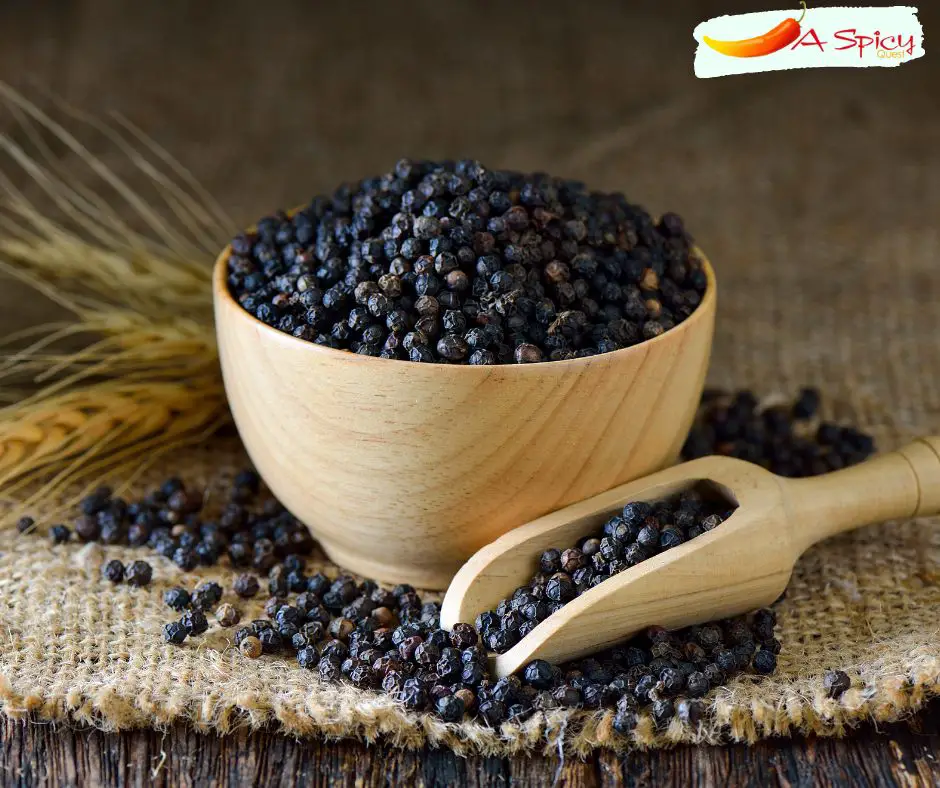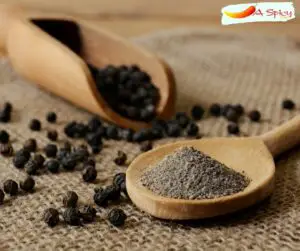
Black pepper is a common ingredient in many dishes. It’s been used for hundreds of years, and it’s considered a staple in many Asian, Indian, and Middle Eastern cuisines. While black pepper has long been considered to be a spice that adds flavor to food and gets rid of bad breath, there’s actually more to it than meets the eye.
In fact, black pepper contains many beneficial compounds however does it contain capsicum?
Does Black Pepper Contain Capsicum?
Black pepper is not related to capsicum peppers. It’s actually the dried fruit of a tropical vine native to India and Southeast Asia, which has been used as a spice since at least 2000 BCE.

Black pepper contains piperine, an alkaloid that gives it its spicy flavor and is responsible for its many health benefits.
While black pepper isn’t as hot as other chile peppers like cayenne or habanero—it ranks high on the Scoville scale. It can still be used in cuisines all over the world for a kick of spice that adds complexity to recipes.
The Effect of Black Pepper on the Body
The effect of black pepper on the body is due to a compound called piperine. Piperine is a neuropeptide that activates TRPV1 receptors in the body, which are found in the tongue and throat. TRPV1 receptors are also found in the gut, which helps explain why black pepper can have such an impact on digestion.
What are the Benefits of Black Pepper
1. Black pepper is a good source of antioxidants
These are compounds that help protect your body from the damaging effects of free radicals. When you eat black pepper, it’s absorbed into the bloodstream and carried to the cells in your body where it supports their antioxidant activities.
2. Black pepper is a good source of vitamin K
You may be surprised to learn that black pepper is actually a good source of vitamin K. Vitamin K is essential for blood clotting, but it’s also important for bone health and maintaining your heart health.
3. Black pepper contains piperine, which has been shown to have anti-inflammatory properties
Piperine is the active ingredient in black pepper. It has been shown to have anti-inflammatory properties when taken orally, and it may be effective for treating many inflammatory conditions like arthritis and asthma.
4. Black pepper has been shown to improve digestion and help with weight loss
As you can see, black pepper has been shown to improve digestion and help with weight loss. So how exactly does it work?
Black pepper contains piperine, which helps promote the release of bile from the gallbladder, meaning it can increase the rate at which you digest your food. This is important because when you digest your food more quickly, you’ll feel fuller for longer—and that could lead to weight loss.
In addition to helping with digestion, black pepper also increases metabolism (the rate at which calories are burned). It does this by stimulating beta-receptors in cells called adipocytes (fat cells), causing them to release fatty acids into circulation and break down triglycerides into glycerol and fatty acids that can then be used as energy sources by muscles or other organs during exercise.
What Does Black Pepper Contain?
Black pepper can contain oleoresins and alkaloids like piperine and chavicine. These are used in the production of medicine, especially painkillers. The antioxidants, flavonoids, essential oil, and other phenolic compounds found in black pepper also help to reduce inflammation and aid digestion. Black pepper has been shown to lower cholesterol levels while helping ward off heart disease.
Who Should Avoid Black Pepper?
Black pepper has been known to increase blood pressure, so it should be avoided by people with high blood pressure, diabetes, and heart disease.
It’s also best to avoid black pepper if you’re pregnant or nursing. The reason for this is that the piperine in black pepper can inhibit an enzyme called CYP3A4 in the liver, causing an increase in drug metabolism (breaking down of medications) and increasing their effectiveness. This is especially true when you take those medications alongside food containing piperine—the active ingredient in black pepper.
Gastrointestinal upset (nausea, vomiting) may occur when consuming large amounts of black pepper regularly over time due to its irritating effect on the lining of your gastrointestinal tract.
Is Black Pepper an Inflammatory Food?
The answer is no. Black pepper is not an inflammatory food, and neither are any of the spices that it contains. However, black pepper does contain piperine which has been shown to have anti-inflammatory properties in humans. Piperine is responsible for giving black pepper its characteristic peppery taste and smell.
Uses of Black Pepper
1. Black pepper is used for cooking
Black pepper is widely used in cooking and has a pungent, spicy taste. It can be added to food at the table or ground ahead of time for use in recipes. Black pepper is often used to season beef, lamb, chicken, and other meats; it’s also a common ingredient in soups and sauces.
2. Black pepper is used in medicine
Black pepper is used in medicine. It has been used as a spice and a medicine for thousands of years, and it is still used today to treat some medical conditions. Black pepper has anti-inflammatory properties, which makes it useful for treating digestive disorders like peptic ulcers or indigestion.
3. Black pepper is used in cosmetics
It’s not just food that black pepper is used in. Black pepper is also used in cosmetics. It can be used for cooling the skin and adding a tingling sensation to the skin, which many people find to be enjoyable.
Black pepper is also used as a preservative. It has been shown to be effective in inhibiting the growth of bacteria, yeast, and mold.
How to Store Black Pepper
- Store in a cool, dry place. If you live in a humid climate or near the sea, it’s best to store black pepper in an airtight container to prevent moisture from getting into your spices.
- Keep away from direct sunlight and do not store near heat sources such as stoves or ovens because they can cause your pepper to lose its flavor and aroma over time.
- Store in a dark place and out of reach of children.
Black pepper is a natural preservative and antioxidant, so it can be used to extend the shelf life of other foods. Store your black peppercorns in a glass jar with an airtight lid to keep out moisture, light, and pests.
Conclusion
Black pepper is a versatile spice that can be used to add flavor to all kinds of foods. It’s also good for your health, especially if you have indigestion or other digestive issues. With its pungent flavor and aroma, black pepper provides plenty of benefits for your body and mind.
However, there are some people who should avoid this spice due to its potential side effects, such as allergic reactions or heartburn. In addition, it should be stored properly, so that it lasts longer before going bad.






